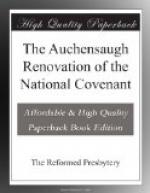3. This upright renewing of covenant with the Lord is a way and mean to procure many mercies, both spiritual and temporal, from the hand of the Lord; which should be a strong inducement and motive to engage us thereunto. Spiritual mercies are entailed upon it, Deut. xxix. 12, 13. “That thou shouldest enter into covenant with the Lord thy God, and into his oath, which the Lord thy God maketh with thee this day: that he may establish thee to-day for a people to himself, and that he may be unto thee a God, as he hath said unto thee, and as he hath sworn unto thy fathers, to Abraham, to Isaac, and to Jacob.” Temporal mercies are also promised to this upright renewing and keeping covenant, Deut. xxix. 9—“Keep therefore the words of this covenant, and do them, that ye may prosper in all that ye do.” And, it is remarked, 2 Chron. xv. 15, that after Asa’s covenant, “the Lord gave them rest round about.”
4. The malice and opposition of the Popish, Prelatical, and malignant party against the covenants, and their doing what in them lies, to make their obligation void and null, may be a motive and argument for the people of God so much the more to avouch their respect to them by a public adherence, especially after long continued breaches.
5. Upright entering into, or renewing covenant with God, is a most sovereign medicine for healing a people’s breaches, as well as their backslidings, the covenant being a cement, as well to join and unite the people of God one to another, as all of them in their duty to God; and, as it flows from the nature of the covenant to unite the friends of reformation, so it is observable as one of the peculiar fruits of covenant-renewing, that union in the Lord has followed thereupon: thus it was with Israel and Judah in the text, who united together in making a covenant with the Lord. Whence all the people of God, who are called to be united and “perfectly joined together in the same spirit, and in the same mind;” and especially they who have been lamentably divided one from another, by their manifold defections from God, and from their covenant-engagements, ought to be strongly inclined, moved, and engaged to this duty; from this consideration, the upright covenant-renewing is a usual mean of land-uniting and church-uniting dispositions amongst the people of God.
As for the manner of renewing covenant with God, and how the duty ought to be gone about, he propounded and opened it in the following particulars, to this effect:—
1. That it must be done with understanding and judgment, both in relation to the nature of the duties we engage to perform in the covenant: grossly ignorant persons being justly deprived of the privilege of engaging in covenant, though bound to inform themselves of its nature and obligation; and also in relation to the breaches, such as would engage into it being called to have some suitable sense and understanding, both how it has been violated, and by what means persons come to be guilty of the breach thereof. So, Neh. x. 28, 29—“Every one that had knowledge and understanding entered into the covenant.”




